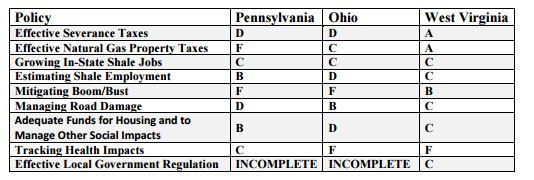This report card evaluates the current policies of Ohio, Pennsylvania, and West Virginia in a range of policy areas informed by the research of the Multi-State Shale Research Collaborative (MSSRC). It compares policies across the three states that address the social and economic issues that unconventional drilling delivers to the communities in which it occurs. The Scorecard thus informs policy-makers about the strengths and weaknesses of their respective policies. The three states can enhance their overall prosperity, and that of shale gas communities, by improving their grades – adopting policies that better mitigate the unanticipated negative impacts of unconventional gas drilling and that take better advantage of new economic activity and revenue generated by natural gas extraction. Read report.
This report card’s grading of state policies is limited to areas in which MSSRC has expertise. For example, we do not address environmental policies and, except for policies related to tracking health impacts, we do not address public health issues.
The table below shows the grades. In two of the nine policy areas, severance and property taxes, West Virginia earns an A: Ohio and Pennsylvania could score higher by emulating West Virginia policies. In four other areas at least one state receives a B. In three areas no state receives more than a C. All three states receive at least one F. These grades mean that all three states could achieve a solid report card if they adopted the policies of the state with the highest grade in each area. A report good enough to make the honor roll would require lifting grades in some areas above the current grade of any of the three states.
